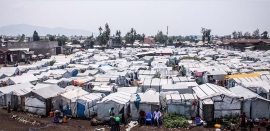The first is around Goma: in the last two years, more than 1.5 million people have been forced to flee their homes due to clashes between rebel gangs, also supported from abroad, and the regular Congolese army and the auxiliary forces associated with it.
Fighting has intensified since the beginning of 2024. “This crisis is characterised by the abundance of armed actors in the conflict, mass flight and a growing number of people in need of humanitarian aid,” a note from the United Nations International Organisation for Migration (IOM) at the end of February tells us. This is yet another humanitarian disaster in a region already devastated by 30 years of conflict. The hundreds of thousands of civilians who have left their lands and villages now live in makeshift camps near Goma, in conditions of extreme poverty.
At the same time, another more hidden conflict is taking place around Beni, 350 km north of Goma, in an area bordering Uganda. Here, in the first half of June, 150 civilians were killed by armed groups of fundamentalists, who for several years have been hiding in the immense equatorial forest of the region, and then went out and massacred the villagers.
Their method is known: either people convert to their religion or they are slaughtered. As the Pope said after the Angelus of 16 June, “among the victims, many are Christians killed in odium fidei. They are martyrs. Their sacrifice is a seed that sprouts and bears fruit, and teaches us to witness to the Gospel with courage and consistency.”
These martyrs remind us of the victims of 60 years ago. On 18 August 2024 in Uvira, in the Province of South Kivu, during a Mass presided over by Cardinal Fridolin Ambongo, Archbishop of Kinshasa and special envoy of Pope Francis, three Saverian missionaries from Parma and a Congolese priest who were killed by Simba rebels "in hatred of the faith" in Baraka and Fizi, in South Kivu, on 28 November 1964, will be declared blessed.
Their martyrdom preceded by three days that of Sister Anuarite, a Congolese nun killed in Isiro (Haut-Uele) on 1 December 1964 and proclaimed blessed by Pope John Paul II in 1985. But in 1964, during the riots that followed the independence of the Congo (1960), many other priests and religious, both missionaries and Congolese, were killed: in the week between 24 November and 1 December alone, 99 men and women of the Church, including a bishop, were martyred, not to mention the numerous civilian victims.
Cardinal Ambongo, interviewed recently by Vatican News, wondered why there are so many victims in this region. “We are all witnesses,” he said “of what is happening in the East, and it is really incomprehensible to see the increase in killings and above all the displacement of people removed from their villages. We ask ourselves why? In addition to those who were killed for their faith, in North Kivu, in particular in the territories of Beni, Butembo, then going down to Goma, passing through Masisi, Rutshuru and Nyiragongo, where they continue to kill. We really ask ourselves how can this happen today? And this happens in a kind of general indifference on the part of the international community.”
“No one is moved by the massacre of the Congolese people,” the cardinal continued. “The massive displacement of the Congolese population within the country and abroad leaves the conscience of the international community indifferent. That really raises questions. What have we, the Congolese people, done to deserve this treatment?”
So all we have to do is despair? “No,” said Cardinal Ambongo. “The Congolese people, by their nature, are a people of hope... It is a people that clings to life, a people that believes in its own future and, despite the gloom of the moment, is convinced that its future will be better. And personally, as a pastor, in the name of Christian hope, I continue to encourage our people not to give in to the temptation of discouragement. Because once we give in to the temptation of discouragement, we will have offered our country to the enemy like a cake on a silver platter.”
“If I have a message for my people” the cardinal concluded “it is never to panic, not to give in to the enemy's game. Christian hope is there to support us in our struggle.”
https://www.infoans.org/en/component/k2/item/21619-democratic-republic-of-congo-the-congolese-people-by-their-nature-are-a-people-of-hope#sigProId5efef5edd8



